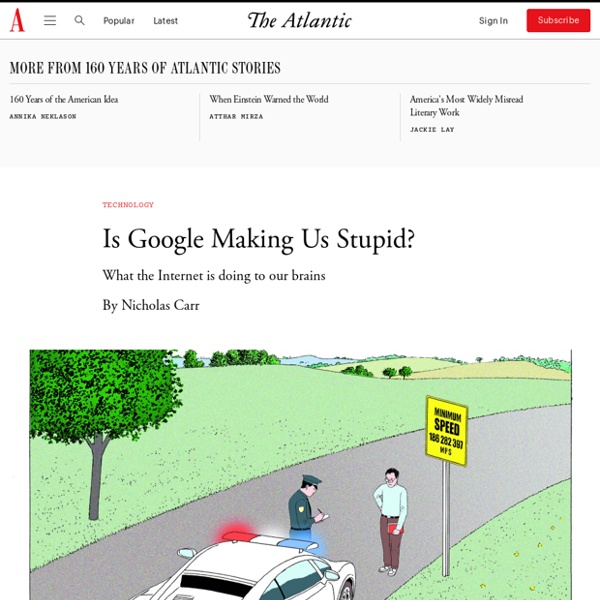World's Virtual Library (80,000+ FREE eBooks, eTexts, On-Line Books, eDocuments)
n Welcome! Over the last decade, a quiet revolution has been going on in the development of a large library of "digital" or "electronic" books. While there are still large gaps, a very substantial body of "Western" thought is available in the form of downloadable or on-line books.
How to know it all
The way to know it all is to change the definition of “all.” Schools do this, for example, by defining “all” to mean everything on a test. Then it’s possible for someone to know it all. Schools create the illusion that the world is finite.
Teenagers aren't reading enough tough books – here's why that matters
We may be living in the digital age, but reading books is still a big part of growing up. And the books that young people read – and how difficult they are – can have a massive impact on their ability to understand exam questions, tell fake news apart from real news and get informed and involved in society. To find out what children are reading, I conducted a study of 963,678 students in 4,364 schools across the UK. I found that from 2016 to 2017, students read 18,044,078 books: it sounds like a lot, but when I dug down into the data, I found some worrying trends. When they’re in primary school, children read books that really challenge them. But once they reach secondary school the level of difficulty doesn’t change much.
The Web Library Building a World Class Personal Library with Free Web Resources
The Web Library: Building a World Class Personal Library with Free Web Resources Online companion to the book. Frequently updated: last update 8-24-2009copyright Nick Tomaiuolo 2009 Indicates a site that is not discussed in the book. News! about FREE resources
Values
Explanations > Values About values | Historical values | Research on values | So what? Values is a confusing word that often gets confused with 'value' as in the value you get from buying a cheap, but well-built house.
25 Ways Schools Can Promote Literacy And Independent Reading
25 Ways Schools Can Promote Literacy Independent Reading contributed by Kimberly Tyson, Ph.D. In the age of the Common Core and its emphasis upon having students take on more challenging text, independent reading and student choice can easily take a back seat to the demands of increased rigor. However, in a balanced literacy program, they remain important. Motivation and choice play key roles in reading.
Global Peace Index – Vision of Humanity
The results this year show that the level of global peacefulness deteriorated, with the average country score falling by 0.34 per cent. This is the ninth deterioration in peacefulness in the last twelve years, with 81 countries improving, and 80 recording deteriorations over the past year. The 2020 GPI reveals a world in which the conflicts and crises that emerged in the past decade have begun to abate, only to be replaced with a new wave of tension and uncertainty as a result of the COVID-19 pandemic. Iceland remains the most peaceful country in the world, a position it has held since 2008. It is joined at the top of the index by New Zealand, Austria, Portugal, and Denmark. Afghanistan is the least peaceful country in the world for the second year in a row, followed by Syria, Iraq, South Sudan and Yemen.
Postmodernism and Truth
Explanations > Critical Theory > Concepts > Postmodernism and Truth Pre-modernist truth | Modernist truth | Post-modernist truth | See also Postmodernism can be a confusing concept that gets dropped into intellectual conversation and presentations, typically to make a complexifying point that prevents easy conclusions being made. But what is postmodernism? Mostly, it is about truth.
OECD Reports Emphasise Reading Skills, Teacher Supply as Keys to Educational Success
13/11/2002 - Reading skills are more important than ever for economic and social interaction in the modern world, and the availability of qualified and motivated teachers is a key factor in running a successful education system, according to two new publications from the OECD. Drawing on recent research, including the findings of the OECD's ongoing PISA surveys of skills and knowledge among 15-year-olds, the OECD's annual Education Policy Analysis and a separate publication called Reading for change - performance and engagement across OECD countries analyse what helps students to acquire essential skills. They focus in particular on what education systems are learning from the PISA survey, whose first results came out last year, and for which more detailed analysis is now being published. The publications will be released at 11.00 a.m. on Tuesday 19 November 2002.
The World Factbook
People from nearly every country share information with CIA, and new individuals contact us daily. If you have information you think might interest CIA due to our foreign intelligence collection mission, there are many ways to reach us. If you know of an imminent threat to a location inside the U.S., immediately contact your local law enforcement or FBI Field Office. For threats outside the U.S., contact CIA or go to a U.S. Embassy or Consulate and ask for the information to be passed to a U.S. official. Please know, CIA does not engage in law enforcement.



